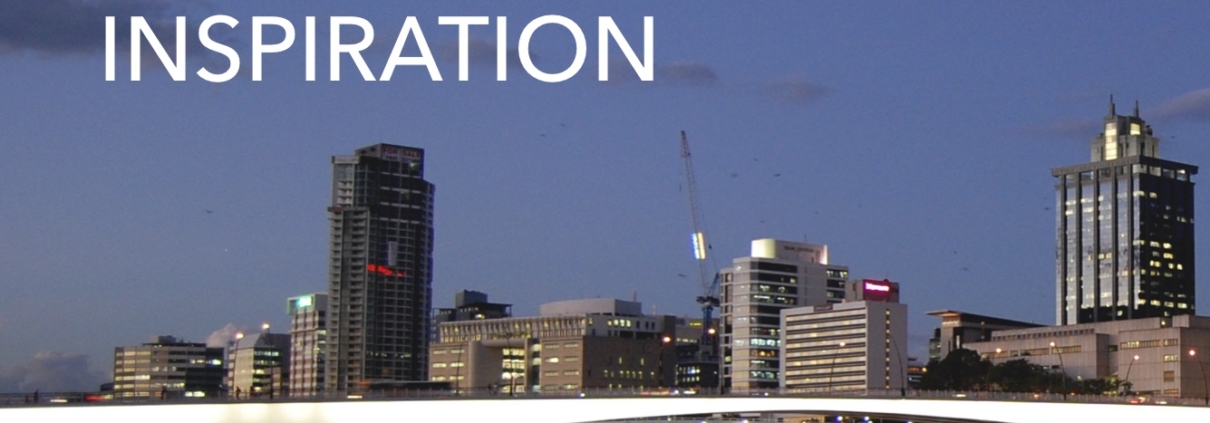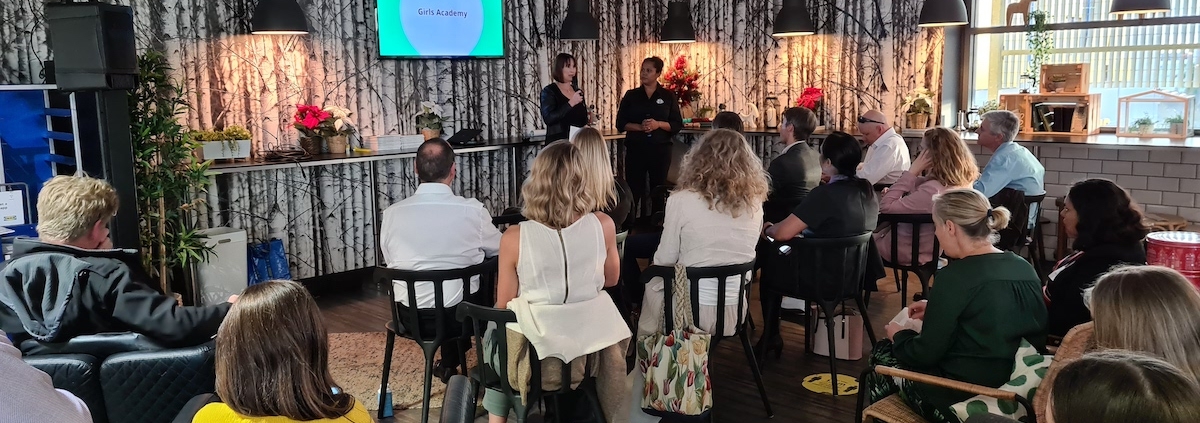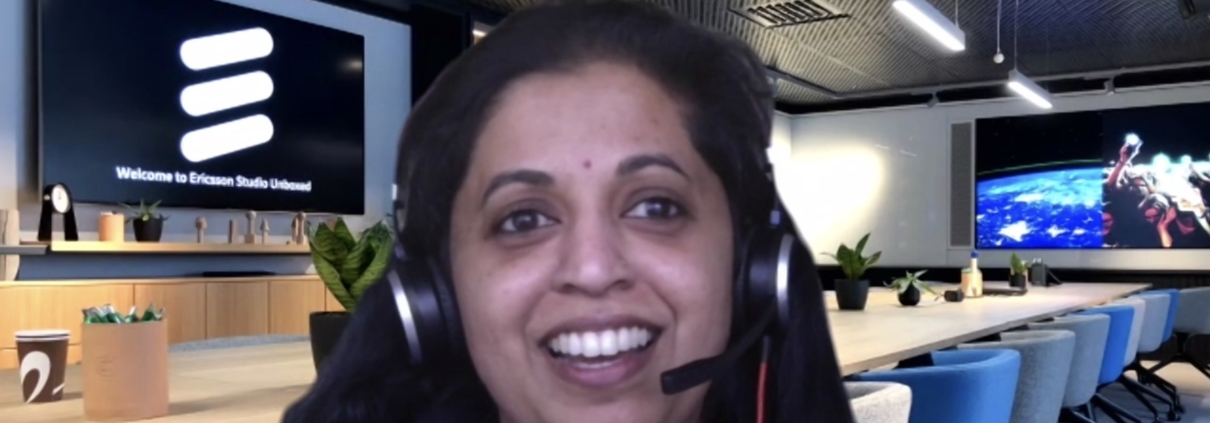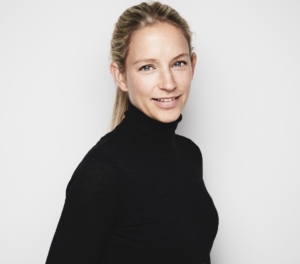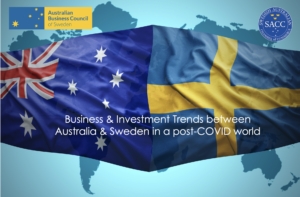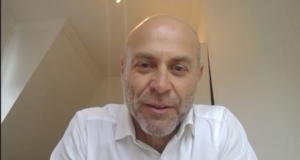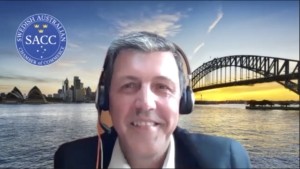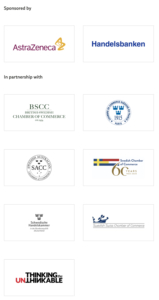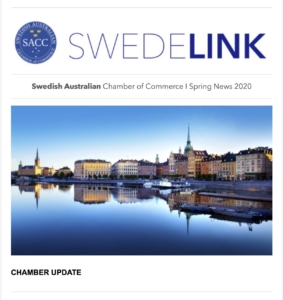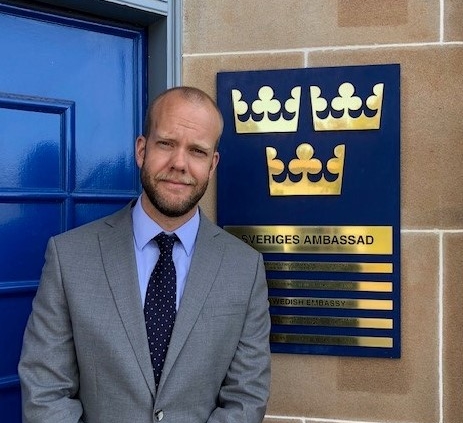Entrepreneurial Inspiration – SACC Virtual Event 12 Nov Summary
IS IT TIME TO START YOUR OWN BUSINESS?
Over the past year, most of us have had to adjust to new ways of working and some may even have had the opportunity to reimagine their own work situation. For many business professionals, dreams about starting something of your own, are common place but sometimes knowing where to start is the biggest hurdle.
On the 12th of November, we organised a webinar, designed to inspire any budding entrepreneurs to take the leap of faith and start their own businesses. To our help, we were delighted to welcome a panel of experienced business entrepreneurs who so generously shared their experience with the audience.
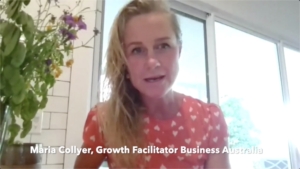 Maria Collyer, Growth Facilitator from the Australian Government’s Business Entrepreneur’s Programme and Libby Helinski, Owner and Founder of Nordic lifestyle business Pappa Sven, both insightful entrepreneurs, shared their respective experience in imagining, planning and building businesses in both Australia and Sweden. The discussion was moderated by Todd Sotheren, President of the Byron Bay Chamber of Commerce, himself an entrepreneur and digital disruptor, who also shared his wealth of knowledge in creating viable businesses.
Maria Collyer, Growth Facilitator from the Australian Government’s Business Entrepreneur’s Programme and Libby Helinski, Owner and Founder of Nordic lifestyle business Pappa Sven, both insightful entrepreneurs, shared their respective experience in imagining, planning and building businesses in both Australia and Sweden. The discussion was moderated by Todd Sotheren, President of the Byron Bay Chamber of Commerce, himself an entrepreneur and digital disruptor, who also shared his wealth of knowledge in creating viable businesses.
The idea to start a juice bar in Sweden came to Maria whilst she was studying in Australia, but the road from idea to set up a business was obviously a big leap. “I think a little pinch of young naivety added to the fact that I actually did it,” Maria said. In 2007, she indeed realised her business idea when she and her then partner opened their first juice bar in Sweden, Naked Juice Bar.
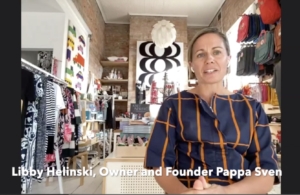 Libby and her husband had an opportunity to move to Sweden through her husband’s work, and Libby fell in love with the whole way of living and daily life in Sweden. “I loved the retail experience in the little towns there. I had never experienced retail done in that way before” she said. Her passion for textiles and natural fibres, as well as her wish to start something of her own, led her to open up a Nordic lifestyle store when she returned back to Australia and Newcastle in 2013. A lifestyle business that also now has expanded to accommodation, offering visitors to Newcastle a stylish B&B option.
Libby and her husband had an opportunity to move to Sweden through her husband’s work, and Libby fell in love with the whole way of living and daily life in Sweden. “I loved the retail experience in the little towns there. I had never experienced retail done in that way before” she said. Her passion for textiles and natural fibres, as well as her wish to start something of her own, led her to open up a Nordic lifestyle store when she returned back to Australia and Newcastle in 2013. A lifestyle business that also now has expanded to accommodation, offering visitors to Newcastle a stylish B&B option.
One of the early lessons for Maria on her entrepreneurial journey was ‘don’t count your chickens before they are hatched’. Whilst still in Australia, she managed to attract the interest of a major shopping mall in Sweden, off one single phone call! She went on to imagine that the business was well underway, only to learn that the person who was initially interested had moved jobs and that the interest from the shopping mall was no longer there. Not before long, she found herself travelling extensively across Sweden selling her juice bar concept to other shopping malls, which turned out to be a challenging task. However, she stubbornly preserved and in the end managed to set up a relationship with a shopping mall in Lund, followed by another one in Stockholm.
One key lesson from Libby’s running her authentic Nordic lifestyle store is around her vision and she can firmly recommend entrepreneurs not to deviate from their vision or from who they truly are. Every time she has been drawn in a direction that is not true to herself or to her vision, whether it is bringing in new products or other aspects of running the business, she has always realised that it is not quite right and she has had to go back to her vision. “Obviously you need to learn to be adaptable and flexible and to respond to the business climate but it is so important to have a clear vision that tells a true story of who you are,” said Libby.
In regards to finding a market for your product, often you need to invest upfront before you know how the market will respond to your product or service.
“We opened our first shop with a massive sunk cost in the fit-out and it was a very nervous moment”. Obviously, Maria did not know if her concept was going to work at that point. She started to home-print flyers and hand out juice-samples in the shopping mall to build up awareness and interest in the product. Seeing people’s reactions when they tried her juices gave Maria confidence that she was on the right track – but the moment she truly knew that the concept had legs was when young toddlers pulled their parents across to her juice bar begging for a smoothie. The parents didn’t bat an eyelid at the prices – their kids screamed for a smoothie rather than ice-cream. Everybody wins.
The moment when Libby knew that she was on to something special, actually happened the very first day when she opened the doors to the store. Something happened that she was completely unprepared for but it confirmed that she had made the right choice in starting her own business. “The day that I opened my doors, six years ago, I had a long line of people waiting for me to open”. Women in their 60ties and 70ties came into the store saying “Oh my goodness, this is like Suomi! I thought, what are they talking about?” said Libby. What Libby didn’t know, not having grown up in Newcastle, was that in the 1970s there was a store in Newcastle selling ARTEK, Marimekko and Iittala, world famous Finnish design, and that already there was a loyal following in Newcastle loving Nordic design. “Without knowing, I had a customer base loyal to the brand” Libby continued.
Maria’s first advice to people looking at business ideas, products and markets are to develop a business plan. A well-developed business plan forces you to think about all the critical points of the business, going through everything from your budget and strategy to your positioning and how to scale up your business. Not to mention what an important tool it is when you are recruiting and building your tribe. “From the outset, we were able to offer a journey rather than a job; this is the concept, this is where we are headed – do you want to come on the journey with us? “ said Maria.
Common for so many business owners and entrepreneurs, is that they get caught up in the minutiae of running everything and they get stuck working in the business rather than on the business. One activity that really has helped Libby throughout her entrepreneurial journey, is to actually take the time and step out of the business and allow herself to stop and properly review her business. “I get great benefit from stepping out of the business for a while, and thinking about our strengths and weaknesses and also looking at new opportunities,” said Libby.
Our very engaged audience asked a number of great questions to our panel and Maria, Libby and Todd gave insights and reflections from their own experience, which was very inspiring to everyone. Click on the video link below to view the full recording of the webinar. In the end, we also conducted a survey of the audience, and a large percentage of the audience felt that they came away from the webinar with a lot of valuable information and that they indeed were inspired enough to start their own business.
We intend to do a follow-up webinar on the topic of entrepreneurship to also discuss the next steps in the entrepreneurial journey, namely scaling up and management buy-out. Stay connected with the Chamber to not miss out for what for sure will be another exciting webinar.
Summary by Teresia Fors, Chair SACC Brisbane QLD Chapter.
Presenting the panellists:
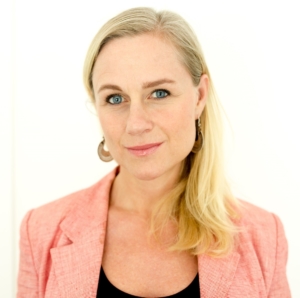 Maria Collyer, Growth Facilitator from the Australian Government’s Business Entrepreneur’s Programme. Maria is a multi-awarded food entrepreneur and business expert as the founder of Sweden’s largest juice bar chain, Naked Juicebar. She has experience from many stages of brand building and operational development, with key skills in scalable models to support continuous growth. She also is experienced as a board member in an angel investment group, and as a jury member in pitch competitions both domestically and internationally. Maria Collyer is currently working as a Growth Facilitator for the federal government’s flagship business initiative, The Entrepreneurs Programme. She delivers strategic advisory services to established businesses in Northern NSW and works with most of the region’s well-known brands across food, beverage, fashion and advanced manufacturing. At European Food Service Summit 2011, Maria featured as a guest speaker, sharing line-up with Starbucks’ Howard Schultz. Her own journey has fuelled a passion for business that she is thrilled to share with fellow entrepreneurs.
Maria Collyer, Growth Facilitator from the Australian Government’s Business Entrepreneur’s Programme. Maria is a multi-awarded food entrepreneur and business expert as the founder of Sweden’s largest juice bar chain, Naked Juicebar. She has experience from many stages of brand building and operational development, with key skills in scalable models to support continuous growth. She also is experienced as a board member in an angel investment group, and as a jury member in pitch competitions both domestically and internationally. Maria Collyer is currently working as a Growth Facilitator for the federal government’s flagship business initiative, The Entrepreneurs Programme. She delivers strategic advisory services to established businesses in Northern NSW and works with most of the region’s well-known brands across food, beverage, fashion and advanced manufacturing. At European Food Service Summit 2011, Maria featured as a guest speaker, sharing line-up with Starbucks’ Howard Schultz. Her own journey has fuelled a passion for business that she is thrilled to share with fellow entrepreneurs.
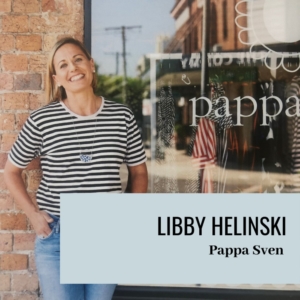
Libby Helinski, Owner and Founder of Nordic lifestyle business Pappa Sven. Libby first opened her Nordic homewares store, Pappa Sven, in Newcastle in 2014. Libby spent a year living in Skellefteå, in the North of Sweden, and wanted to be able to share her love of the Nordic way of life and create a truly unique retail experience in her hometown. Pappa Sven now consists of a retail store, online store and 2 distinctly Nordic themed Air BnB properties which attracts visitors from all over Australia. Libby graduated from UNSW in 1998 with a degree in Textile Science and her passion for textiles is evident in the business which she has created today. With a strong focus on natural fibres, authentic Scandinavian design and timeless design Libby has loved bringing together her many interests to create the Pappa Sven brand. Libby lives in Newcastle with her husband Matt and 2 teenage daughters Jessica and Lucy
Thanks to all participants and to the SACC Brisbane Chapter for organising the event.
View the full webinar here
Summary SACC and IKEA Sustainability Forum 12 November, Perth
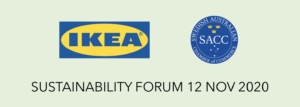 At last year’s SACC WA and IKEA event, we discussed a few of the strategies IKEA incorporate in their business model to reduce its global environmental footprint. Despite the uncertain times and the overhanging threat of COVID-19, we were invited back for a follow up to last year’s popular event.
At last year’s SACC WA and IKEA event, we discussed a few of the strategies IKEA incorporate in their business model to reduce its global environmental footprint. Despite the uncertain times and the overhanging threat of COVID-19, we were invited back for a follow up to last year’s popular event.- The Girls Academy; a school-based mentoring program working nationally to drive community-led solutions aimed at overcoming the varied obstacles that prevent Aboriginal and Torres Strait Islander girls from attending school and achieving personally beyond graduation.
- Working with Refugees; IKEA’s own Skills for Employment program, aimed to provide growth opportunities for refugees.
- Let’s Play for Change; an annual initiative run by IKEA for children around the world, encouraging them to connect, learn, grow and have fun through play.
Women in Tech webinar 14 October – Summary
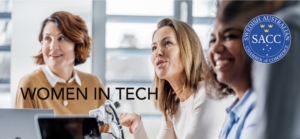 On 14 October the Melbourne Chapter of the SACC hosted a ‘Women in Tech’ webinar, which addressed the topic of gender equality within the technology industry. More than 80 participants were treated to a very engaging webinar that covered a lot of terrain on the topic, revealing a lot of practical advice for aspiring ‘Women in Tech’ and the companies that employ them. The moderator for the webinar was Joanne Woo, Head of Marketing & Communications at ABB Australia and Curator & Speaker Coach for TEDx Australia. Joanne was joined by three senior leaders from the technology industry who openly shared their career experiences as ‘Women in Tech’:
On 14 October the Melbourne Chapter of the SACC hosted a ‘Women in Tech’ webinar, which addressed the topic of gender equality within the technology industry. More than 80 participants were treated to a very engaging webinar that covered a lot of terrain on the topic, revealing a lot of practical advice for aspiring ‘Women in Tech’ and the companies that employ them. The moderator for the webinar was Joanne Woo, Head of Marketing & Communications at ABB Australia and Curator & Speaker Coach for TEDx Australia. Joanne was joined by three senior leaders from the technology industry who openly shared their career experiences as ‘Women in Tech’:
- Brith Isaksson, Global Head of Food and Beverage, ABB Motion, Sweden
- Anna Nordell-Westling, CMO & Co-Founder Sana Labs, Sweden
- Rajina Sujanthan, IoT Program Director, Ericsson, Australia
 Joanne Woo opened the webinar with several poll questions, including a question directed to females already working within the technology industry: “What is your biggest challenge as a woman in tech?” In response, it was unanimous that a lack of female role models, particularly at senior levels within the industry was viewed as a major challenge. Other challenges identified as barriers to diversity, included females not being taken seriously by their male counterparts, the gender pay gap, the ‘glass ceiling’ and lack of diversity within their company. A small number of women cited that they saw no challenges.
Joanne Woo opened the webinar with several poll questions, including a question directed to females already working within the technology industry: “What is your biggest challenge as a woman in tech?” In response, it was unanimous that a lack of female role models, particularly at senior levels within the industry was viewed as a major challenge. Other challenges identified as barriers to diversity, included females not being taken seriously by their male counterparts, the gender pay gap, the ‘glass ceiling’ and lack of diversity within their company. A small number of women cited that they saw no challenges.
Throughout the webinar, the panellists offered advice for women who are building their careers within the technology industry:
Find out what you are passionate about.
All three of the panellists encouraged aspiring ‘Women in Tech’ to pursue career paths that they are passionate about. Both Brith Isaksson and Rajina Sujanthan initially studied degrees in chemistry and engineering respectively, prior to commencing their careers in technical roles. Brith Isaksson initially worked in research and development at ABB in Vasterås and Rajina Sujanthan worked in project management for Ericsson in Melbourne. Both would later ascend to global management roles within their companies.
 Brith Isaksson recalled with great fondness that as a child when playing with Barbie dolls she could never have envisaged that many years later she would travel half-way across the world as an engineer for ABB to visit a Barbie factory in Indonesia. It became evident that the reference to Barbie was also a great analogy for the need for the technology industry to also keep up with the changing times and move towards increased diversity. “I think the evolution of the (Barbie) brand has shown an evolution of society in terms of that there is no stereotype and that the world is made up of diverse people,” said Joanne Woo.
Brith Isaksson recalled with great fondness that as a child when playing with Barbie dolls she could never have envisaged that many years later she would travel half-way across the world as an engineer for ABB to visit a Barbie factory in Indonesia. It became evident that the reference to Barbie was also a great analogy for the need for the technology industry to also keep up with the changing times and move towards increased diversity. “I think the evolution of the (Barbie) brand has shown an evolution of society in terms of that there is no stereotype and that the world is made up of diverse people,” said Joanne Woo.
Unlike the other panellists, Anna Nordell-Westling’s career journey started outside of the technology industry, working for leading advertising agencies such as Saatchi and Saatchi and King, before starting her own advertising firm servicing clients all over the world. A chance meeting and some encouragement from a mentor would later see her co-found Sana Labs, an artificial intelligence (AI) start-up in Stockholm. Four years later, the firm employs 30 people from all over the world who are passionate about leveraging AI to enhance workforce learning outcomes.
Be open to taking up career opportunities that present themselves.
All three panellists highlighted that women will sometimes decide to not take up a career opportunity, for fear of not being qualified or experienced enough – a  phenomenon referred to as ‘imposter syndrome.’ “Take all of the opportunities (or risks) that come your way,” said Rajina Sujanthan. She went on to emphasise that taking on a role that is particularly challenging or a public speaking engagement are all experiences that help to build self-confidence. She recalled working on a particularly challenging project early on in her career at Ericsson, which resulted in great customer reviews, thereby leading to further career development opportunities. These sentiments were also echoed by the other panellists, who emphasized the importance of not limiting oneself. “When the opportunities come, you should take them… I never look back… that’s important …. it’s better to make a decision,” said Brith Isaksson. “It is also important that we don’t limit ourselves, it is us that only limit ourselves. The sky is the limit,” said Anna Nordell-Westling.
phenomenon referred to as ‘imposter syndrome.’ “Take all of the opportunities (or risks) that come your way,” said Rajina Sujanthan. She went on to emphasise that taking on a role that is particularly challenging or a public speaking engagement are all experiences that help to build self-confidence. She recalled working on a particularly challenging project early on in her career at Ericsson, which resulted in great customer reviews, thereby leading to further career development opportunities. These sentiments were also echoed by the other panellists, who emphasized the importance of not limiting oneself. “When the opportunities come, you should take them… I never look back… that’s important …. it’s better to make a decision,” said Brith Isaksson. “It is also important that we don’t limit ourselves, it is us that only limit ourselves. The sky is the limit,” said Anna Nordell-Westling.
If you are offered a career opportunity that you are unable to take up, “pay it forward” to another female.
Whether that be an opportunity to advance your career by getting up on stage to talk about one’s career or company, joining a panel or a board, the panellists highlighted that women will say no to such opportunities more so than men. This can sometimes be due to being too busy or needing to prioritise family commitments. “I always try to recommend another excellent female for a speaking event or board seat… that’s something we can all do on a bigger scale,” said Anna Nordell-Westling.
The panellists also offered some practical advice for companies who are seeking to improve gender equality outcomes.
Send a clear message from the top that diversity is important – in word and in action.
The panellists encouraged the top management of companies within the technology industry to send a clear message down the line that diversity is important. “That gender diversity is a main priority needs to be communicated from the highest level in the company, so it becomes easier for people in the organisation to take that on,” said Anna Nordell-Westling.
Other actions to be considered might be to ensure that male and female candidates are put forward for all open positions. Setting of diversity targets for women in management positions was also viewed as important, as it offers something to aim for.
Develop leadership and mentoring programs for females at all levels of organisations and beyond.
This was viewed by the panellists as a prerequisite to developing role models at all levels of organisations, particularly within the upper management levels where women tend to be scarcer. Rajina Sujanthan mentioned that it was the opportunity to participate in various global leadership programs within Ericsson that allowed her to build her self-confidence, which led her to take on greater challenges. “It is important that women in leading positions share, starting programs to grow the first line, second line and third lines of management,” said Brith Isaksson. She went on further to say that such programs allow future female role models need to be identified and developed, which can help to bridge the lack of female talent, particularly at the upper levels within organisations.
Regina Sujanthan also suggested that companies could even go beyond mentoring their female employees, to also look at setting up mentoring programs with female students at universities and other educational institutions.
Senior executives should not just mentor, but also sponsor women more.
The panellists also highlighted the need for senior-level executives to move beyond simply mentoring top female talents, to actively sponsoring them. This includes advocating and speaking up for female executives and actively helping them to gain visibility within the organisation by putting them forward for career development opportunities. “There is a lot of mentoring going on, but there are not a lot of people speaking up for the females… even if it is just a matter of saying that there is this person interested moving into a role,” said Rajina Sujanthan.
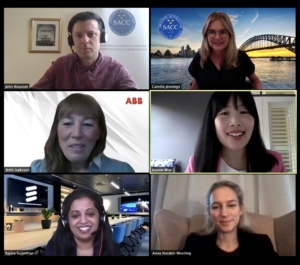
In conclusion, the webinar offered a lot of inspiration and food for thought for both aspiring “Women in Tech” and companies alike to work towards achieving greater levels of equality within the workplace. The Melbourne Chapter would like to thank Joanne Woo, Brith Isaksson, Anna Nordell-Westling and Rajina Sujanthan for volunteering their time to participate in the webinar. We would also like to thank ABB and Camilla Jennings, SACC Business and Events Manager, for their support in organising the webinar.
By John Rieusset, SACC Melbourne VIC Chapter
Keep your eyes on the SACC socials Linkedin and Facebook for further updates as announcements are made about future events, and check out the Recent Events and Webinars page on the SACC website for summaries and recordings of our recent presentations. Please contact us for questions and further information: sacc@swedishchamber.com.au.
Listen to the full webinar and the interactive Q&A session here.
Business & Investment Trends between Australia & Sweden
On the 29th of September SACC and the Australian Business Council of Sweden joined forces and delivered, for the first time ever, a joint webinar to its members both in Sweden and in Australia.
Special Guests, HE Bernard Philip Australian Ambassador to Sweden and HE Henrik Cederin, Swedish Ambassador to Australia, were joined by Martin Ekberg, Trade & Invest Commissioner and Country Manager to Australia, New Zealand and the Pacific Islands and Jennifer Mackinlay, Senior Trade and Investment Commissioner for UK, Ireland & Nordics, in a discussion about business and investment trends in Australia and Sweden in a post-covid-19 world.
This historic event was opened by the two Chairmen of the Chambers, Jan Gardberg and Warren Campbell, who jointly offered a warm welcome to the audience, listening in from both sides of the world.
Over the past six months, SACC has through a number of webinars, explored the consequences and the impact that covid-19 has had on business and trade and what businesses have learned from this pandemic. These webinars have been including representatives from many different sectors, offering different aspects and what has been clear throughout these discussions is the need for businesses and individuals to adopt and transform and that trust, inclusion and collaboration will be lighthouses to guide the way forward.
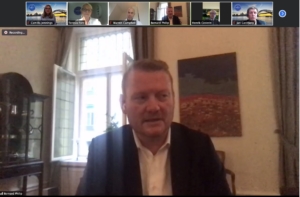 In reference to what the outlook is for the trade and investment policy in Australia and Europe, post this pandemic and considering if there is a risk of renewed protectionism, Ambassador Philip acknowledged that there is indeed some risk of renewed protectionism. Whether it manifests as trade tensions between the major powers, US and China, or in some cases, US and the European Union, or as challenges to the multilateral system, these are indeed signs of increased protectionism.
In reference to what the outlook is for the trade and investment policy in Australia and Europe, post this pandemic and considering if there is a risk of renewed protectionism, Ambassador Philip acknowledged that there is indeed some risk of renewed protectionism. Whether it manifests as trade tensions between the major powers, US and China, or in some cases, US and the European Union, or as challenges to the multilateral system, these are indeed signs of increased protectionism.
“We have also seen countries looking inwards which in part, is understandable, but it has also led to unfortunate actions like restrictions on the flow of medical supply as we saw early on in the crisis. There is also a challenge for policy makers as they wrestle with important policy matters like digital trade or climate, to navigate the right balance between good regulation and then actions that stray over to protectionism” said Ambassador Philip. “The broader risk in all of this is the possible intersection between protectionism and geopolitical competition, where they can intersect in a destabilising way. So, I think we do have to recognise that it is an environment that we have to work very hard to manage” continued Ambassador Philip. Ambassador Philip highlighted that there still are some bright spots. Australia has a renewed focus on multilateralism, including its engagement with the G20, OECD and WTO, which is more important than ever. One example of Australia’s support of multilateralism is the covax facility that will provide equitable access to the vaccine when it comes.
Australia and the European Union is continuing to make good progress on the Free Trade Agreement negotiations. Ambassador Philip concluded that “The overall picture is one with encouraging signs”. There are some adjustments that are sensible that could point to increased protectionism, in terms of policies, whether it is building better resilience in supply chains or from a national security perspective, giving greater attention to investment screening. However, “Australia’s view, a view I believe also shared by Sweden, is that this has to be done within a construct of support for free trade,” said Ambassador Philip.
Europe seems to have doubled down on its commitment to a Green Deal, while the Australian Government has just released its first Low Emissions Technology Statement. This presents opportunities for business and investment between Australia and Sweden. Ambassador Philip said that this area is “One of the most exciting areas of the relationship between Sweden and Australia, and more generally between Europe and Australia”. There is a strong commitment in Europe for sustainability and emissions reduction as a central part of the post- covid-19 recovery, which was highlighted in its revised 2030 target but also seen through the role that fiscal stimulus can play in delivering emission reduction targets. Ambassador Philip is recognising an exciting trend in the Nordics around decarbonisation and recognises that there is a powerful sense of companies seeing a competitive advantage of being an early mover in this space. “There is a similar movement in Australia where we really are on an accelerated drive for emissions reduction”. In Australia’s recent Low Emissions Technology Statement, there is a focus on five priority technologies and looking across these areas, there are plenty of complementarities between Australia and Europe. On a political level, one group that Australia joined last year, is the Leadership Group on Industry Transition led by Sweden and India, which presents a good platform for change.
 From a Swedish perspective, Ambassador Henrik Cederin shared his perspective on the opportunities and focus areas for business and trade post the pandemic. “From a political perspective, the covid-19 crisis which has led to a shift for online meetings which in turn has led to very good interactions [between Australia and Sweden] with a number of meetings taking place even at the very highest level which in turn bodes well for a good corporate involvement,” said Ambassador Cederin. Whilst there has been a slowdown in visitors from Sweden, online exchange has exploded, which is a promising sign of increased cooperation between Sweden and Australia. The Ambassador also referenced the existing strong position of Swedish businesses in Australia with more than 200 companies with an established presence in Australia, employing some 20,000 people. Companies that are often regarded as local companies with local capabilities. Australia stands out as a critical market for Swedish companies, with a growing economy, albeit the hiccup of covid-19, the long-term trajectory is good.
From a Swedish perspective, Ambassador Henrik Cederin shared his perspective on the opportunities and focus areas for business and trade post the pandemic. “From a political perspective, the covid-19 crisis which has led to a shift for online meetings which in turn has led to very good interactions [between Australia and Sweden] with a number of meetings taking place even at the very highest level which in turn bodes well for a good corporate involvement,” said Ambassador Cederin. Whilst there has been a slowdown in visitors from Sweden, online exchange has exploded, which is a promising sign of increased cooperation between Sweden and Australia. The Ambassador also referenced the existing strong position of Swedish businesses in Australia with more than 200 companies with an established presence in Australia, employing some 20,000 people. Companies that are often regarded as local companies with local capabilities. Australia stands out as a critical market for Swedish companies, with a growing economy, albeit the hiccup of covid-19, the long-term trajectory is good.
Sustainability is clearly a focus area for Australia, which will bring opportunities for Swedish companies to invest in Australia. Swedish companies are often leaders in adopting sustainability perspectives and could bring valuable technology and knowhow to Australia in this regard. What Swedish companies can offer the Australian market with the new demands in this market place, makes it a good fit. “We will play a role in the green transitioning that will take place in Australia,” said Ambassador Cederin.
In reference to issues that we need to pay particular attention to in a global trade perspective, Ambassador Cederin refers to the shock that we have seen to supply chains and the tendency that we have seen to reassure local supply chains, politically labelled as strategic autonomy. “This portrays a challenge to increased openness. The fear that this crisis has instilled in this market has been seen in many governments around the world. We have to be active in advocacy for open trade” said Ambassador Cederin. Ambassador Cederin continued “We know that in Sweden, we built our strong economy on open trade and our firm belief is that it [open trade] will be helpful for all countries”.
 Martin Ekberg said that there are six major shifts that we now see in the Australian business landscape that have been accelerated due to covid-19. Some already ongoing pre-covid-19 but some have increased and they are; the upgrade of Australian defence capabilities, fast-tracking of key infrastructure and the focus to drive local manufacturing competitiveness. More industry agnostic shifts such as the uptake in zero emissions technology, uptake in digitalisation and cyber security but also a growing ambition to diversify Australia’s trade footprint in terms of trade partners, are also recognised shifts. “Covid-19, as well as the trade conflict between the US and China, has exposed Australia’s trade vulnerability,” said Martin Ekberg. Australia’s high dependability on China has hit Australia very hard. Martin Ekberg also referred to the trade restrictions imposed by China on Australian exports and predicted that these may well continue, which will create a lot of economic uncertainty. This emerging situation should mean opportunities for Swedish companies, Australia already is the 4th largest export market for Sweden outside of the European Union.
Martin Ekberg said that there are six major shifts that we now see in the Australian business landscape that have been accelerated due to covid-19. Some already ongoing pre-covid-19 but some have increased and they are; the upgrade of Australian defence capabilities, fast-tracking of key infrastructure and the focus to drive local manufacturing competitiveness. More industry agnostic shifts such as the uptake in zero emissions technology, uptake in digitalisation and cyber security but also a growing ambition to diversify Australia’s trade footprint in terms of trade partners, are also recognised shifts. “Covid-19, as well as the trade conflict between the US and China, has exposed Australia’s trade vulnerability,” said Martin Ekberg. Australia’s high dependability on China has hit Australia very hard. Martin Ekberg also referred to the trade restrictions imposed by China on Australian exports and predicted that these may well continue, which will create a lot of economic uncertainty. This emerging situation should mean opportunities for Swedish companies, Australia already is the 4th largest export market for Sweden outside of the European Union.
Another area with growth potential that Martin Ekberg would like to stress, is smart manufacturing. Sweden has a solid track record in smart manufacturing, an area that has been somewhat neglected in Australia (Australia ranks the worst compared to other OECD countries). Manufacturing self-sufficiency is therefore an opportunity for increased bilateral knowledge exchange, which will assist in making Australia a manufacturing hub. Adaptation of new technology which will enable industry 4.0 and also offers an opportunity to build a local supply chain. “This could be the right time to rethink production strategy,” said Martin Ekberg. By way of advice for Swedish businesses looking at investing in the Australian market, Martin Ekberg could conclude a few areas for businesses to look into.
“The transition to a more sustainable Australia offers a lot of opportunities for Swedish companies to pioneer sustainable solutions in Australia.” Martin Ekberg also highlighted that there has been a shift on how we phrase the word ‘domestic’ as it is no longer only referring to having a local presence. Having a domestic operation also entails local investment in r&d, in manufacturing but also looking at export opportunities from Australia to the regional market. Other aspects for businesses to consider is to stay premium as it will always deliver value and to stay close to customers. Another recommendation is to acquire local knowhow, a local knowledge ecosystem of sorts, maybe through acquisitions.
 Jennifer Mackinlay commented that despite the overwhelming challenges engendered by Covid-19, the pandemic has triggered a lot of new opportunities including potential opportunities for reinvestment in Australia. Challenges to supply chains have seen a renewed focus on resilience which in turn has underscored the role and acceleration of digital technologies as well as new technologies such as 3D printing. Australia’s renewed focus on manufacturing and digital technology across all sectors is creating opportunities for example in tele-health, telework and online education which is fast tracking the digital economy. “These strategies will help with Australia’s economic recovery but will also underline the compelling business case for investment in Australia,” said Jennifer Mackinlay.
Jennifer Mackinlay commented that despite the overwhelming challenges engendered by Covid-19, the pandemic has triggered a lot of new opportunities including potential opportunities for reinvestment in Australia. Challenges to supply chains have seen a renewed focus on resilience which in turn has underscored the role and acceleration of digital technologies as well as new technologies such as 3D printing. Australia’s renewed focus on manufacturing and digital technology across all sectors is creating opportunities for example in tele-health, telework and online education which is fast tracking the digital economy. “These strategies will help with Australia’s economic recovery but will also underline the compelling business case for investment in Australia,” said Jennifer Mackinlay.
Australia’s Low Emission Technology Statement, is recognised as another opportunity for Swedish businesses. The Australian Government is investing in the next generation of energy technologies that will deliver lower emissions, reduced costs and more jobs. With Sweden considered a global leader in this regard, Swedish businesses will be well placed to leverage this opportunity. One of the prioritised technologies in the Low Emission Technology Statement is clean hydrogen. The National Hydrogen Strategy released in 2019 sets out the initial actions needed to support an emerging domestic industry. The Australian Government’s new $1.9 billion investment package in new energy technologies includes new commitments that will support hydrogen, including $1.6 billion in new funding for ARENA, a $74.5 million Future Fuels package, and a $70.2 million to activate regional hydrogen export hubs. The National Hydrogen Strategy complemented by the Technology Investment Roadmap and Low Emission Technology Statement will enhance Australia’s energy security, will create jobs and build a hydrogen export industry.
Swedish companies offering hydrogen technology looking to invest in Australia should also explore opportunities to get involved in the hydrogen strategy pursuant to which Australia aspires to become a world leading hydrogen producer. Jennifer Mackinlay also mentioned the circular economy as another area where there is scope for Swedish investment in Australia, following Australia’s one billion dollar commitment to the transformation of Australia’s waste and recycling capacity.
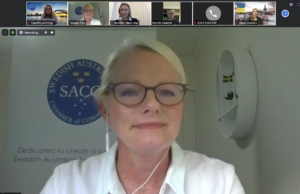 This session was moderated by Teresia Fors, Vice President of SACC.
This session was moderated by Teresia Fors, Vice President of SACC.
Listen to the full webinar and the interactive Q&A session here.
The SACC and ABCS will continue this collaboration and aims to bring you another webinar in the near future where we will take a deeper dive into some of the topics raised during this session.
Keep your eyes on the SACC socials Linkedin and Facebook for further updates as announcements are made about future events, and check out the Recent Events and Webinars page on the SACC website for summaries and recordings of our recent presentations. Please contact us for questions and further information: sacc@swedishchamber.com.au.
Emerging stronger on the other side – What awaits us at the end of the pandemic?
On 24 September the SACC teamed up with the Swedish Chambers in the UK and Europe for this high profile virtual event “Emerging stronger on the other side”. The discussion focused on the preparation for normalcy after the pandemic for business and society. The conference featured a line-up of prominent speakers, all experts within their respective fields, including Cecilia Malmström, Visiting Professor at University of Gothenburg, and former EU Trade Commissioner, Carl-Henric Svanberg, Chairman of Royal Swedish Academy of Engineering Sciences, and Chairman of Volvo Group, Ylva Berg, CEO of Business Sweden and James Sproule, UK Chief Economist at Handelsbanken. The discussions were moderated by Nik Gowing, Director and Founder of Thinking the Unthinkable and former BBC news anchor.
All participants to the discussion seemed to agree that the pandemic we currently find ourselves in will not have a clear ending. Ylva Berg concluded that ‘the other side’ will not look like what we were used to seeing before the pandemic. “I think the pandemic has affected all parts of our society in a profound way – our personal lives and business lives, but also the geopolitical and global society in a way which is something that we will have to get used to and live with for some time.” Reiterating what Cecilia Malmström and Carl-Henric Svanberg had earlier touched upon, Ylva stated that there is good transformation taking place right now at a rapid pace and that we should plan for the worst and hope for the best. “If we have a more positive view and really try to fight for that, we can both see business opportunities and also use what we have learnt during the pandemic and apply that to other areas in society.”
While starting off by stating that the UK is facing the worst recession since the second world war, James Sproule expressed optimism regarding the future. “I think that global trade and globalisation will turn more towards the sharing of ideas rather than the transfer of goods. The big driving force in the future is going to be the desire of people to talk to one another, to share ideas, processes and approaches. The people who do well in the long-term and are not the strongest but the most adaptable. I see a great deal of adaptability within many European economies and societies and I think that’s ultimately a huge strength.”
Responding to the question of what businesses will emerge stronger post-pandemic, and what the positive societal effects the pandemic will bring, Carl-Henric Svanberg concluded that digitisation offers tons of opportunities. “No one can predict exactly what the future holds and what jobs will actually emerge, but by giving entrepreneurs the right opportunities and making sure that the infrastructure is there, they will create a ton of jobs.” He also stated that we will not see a greening of economies unless we also manage to successfully digitise. “Almost every green idea that comes up is based on new technology.”
Cecilia Malmström concluded that it is necessary for politicians, government and businesses in western democracies to realise that there is something on the other side and that we must come out stronger. “It is not the first time we face a pandemic, it will not be the last time, and there will also be other huge crises. This is an opportunity to really get together and to formulate new visions and make sure that they are broadly anchored into different parts of society. It may sound a bit banal but I think that’s the only way forward.”
Did you miss the chance to attend the webinar? We have made it available on Youtube in its entirety, where you can listen in on the discussions.
Watch the webinar on Youtube
Organised by



